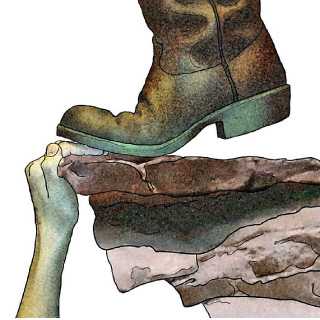Tuesday Feb 17, 2026
Tuesday Feb 17, 2026
Monday, 27 July 2020 00:07 - - {{hitsCtrl.values.hits}}
 If you think nothing will change, then do not bother to read this essay. We control our future with what we choose now. If you think nothing will change, indeed nothing will change. The absence of resolve, the presumption of the impossibility to make a change is self-fulfilling.
If you think nothing will change, then do not bother to read this essay. We control our future with what we choose now. If you think nothing will change, indeed nothing will change. The absence of resolve, the presumption of the impossibility to make a change is self-fulfilling.
Powerlessness can be transformed into a force capable of achieving justice. History does not teach fatalism.
There are moments when the will of a handful of free men breaks through determinism and opens new roads. We can make 5 August such a pivotal moment.
The success of the political class to perpetuate itself, mired in corruption and incompetence, is because of the willingness of people to wilfully disbelieve what they know to be true. They are ready to bear-hug the brazen untruth, because it is so bloody convenient.
In about 10 days, on 5 August, the powerless will speak to power. It will be a momentary tryst the powerless will have with the self-perpetuating political class.
Every four or five years, the powerless go through this cycle of hope followed by disaffection. We call it representative democracy.
The Italian writer Giuseppe Prezzolini who presciently saw the rise of Mussolini and authoritarian tyranny in his land attributed his land’s misfortune to the backroom deals amongst counterfeit democratic contenders who were subverting democracy. He said it for all time.
“Representative Government is artifice, a political myth, designed to conceal from the masses the dominance of a self-selected, self-perpetuating, and self-serving traditional ruling class.”
The chili powder thrower, the ultra-nationalist with dual identity acquiring the Midas touch when the revolution is abandoned in favour of tribal roots, the bloke who sleepwalked in to a seaside penthouse leased by his wifey, the four-time Prime Minister who has known Adam Smith from the time of Adam are all part of this artifice and the myth that we call representative competitive democracy.
They all thrive on the hocus pocus that sovereignty lies with ‘we the people’. They all hope to be back in business in the first week of September by the grace of the sovereignty of the people.
Why do we fall into this trap election after election?
In his celebrated discourse – ‘The republic’, Plato describes how voters manage to elect the incompetent and the self-seeking.
“Imagine yourself in a ship. There is a captain who is taller and stronger than any of the crew. The crew (that is the voters) don’t know that the man is a wee bit deaf and is also short-sighted.”
Plato argues that the crew – the voters are dazzled by the man’s appearances assuming that his relative height could mean that he is a better navigator. Plato’s allegory holds a lesson. The average voter does not possess the rational faculties or the adequate knowledge to elect competent rulers.
The controversy over the demolition of the so-called royal audience hall of King Buwanekabahu in Kurunegala is a jaw-dropping demonstration of the puerile politics that passes for sublime State craft.
Nobody has bothered to ask why this pristine ‘Versailles’ of Buwanekabahu was leased out to a private party to run a roadside eatery. Amid the melee, Prime Minister Mahinda Rajapaksa discovered that the king of Kurunegala had a Muslim concubine.
When I listened to the former President, current Prime minister and redeemer who ended the war mumbling about the Muslim princess in the harem of an obscure monarch, I could only weep for him. He reminded me of the apt words of Gore Vidal on decadence.
“As societies grow decadent, the language grows decadent too. Words are used to disguise, not to illuminate. Words are to confuse, so that at election time people will solemnly vote against their own interests.”
The farcical exchange over the council chamber of King Buwanekabahu amidst a national election constrained by a pandemic is an indicator of the impudence and imprudence of those now in power demanding a two-thirds majority to shape their own ‘council chamber’ and determine the composition and complexion of their concubines.
Last night I watched Minister Johnston Fernando who, apart from distilling spirits, seems to know to locate the distilled essence of 13th century Sri Lankan architecture. I also discovered that Prime Minister Mahinda Rajapaksa in addition to his many achievements is an authority on the cultural plurality practiced in the harem of King Buwanekabahu.
In a sense the disarming nonchalance displayed by both Johnston Fernando and the Premier is a revealing guide of the morality or its absence in our politics.
The national heritage site has earned many labels – a brothel, a bar room or a roadside inn. The debate in the heat of a General Election has turned out to be a funny kind of a moral triumph for the perverted mind.
A thief who has broken into a bedroom claims his sense of shame has been outraged, and by threatening the occupants with exposure of an immoral act, he blackmails them into not bringing charges for burglary.
We are a nation State with a dysfunctional democracy. Our people are largely apathetic to corruption and transgressions by the ruling clique. Mesmerised by mass consumerism we simply don’t care to find out how and why the Government keeps on printing paper money. We have become a society that has put its collective conscience in cold storage.
I have borrowed the caption ‘The Power of the Powerless’ from the seminal paper under the same title by the Czech playwright, philosopher and four-term President Václav Havel.
It was meant to be a discussion paper for Polish and Czechoslovak dissidents about power and freedom.
‘The Power of the Powerless’ was a seminal tract that challenged the foundational fallacies or miscalculations of doctrinaire Marxism and stampeding unchecked capitalism. In it the irrepressible Vaclav Havel, the playwright with a sharp sense for poignancy, uses an anecdote of a ‘shopkeeper’.
Behind the window of his small food stall, he places a sign that simply states: “Workers of the world, unite!”
It is the phrase that Karl Marx used in his Communist Manifesto to call workers for a revolution that would destroy capitalism.
Why does he do it? He is a small-time shopkeeper. What does it matter if the workers of the world unite or devoured each other? Which is what the workers usually do in any case, when led by aimless idiots.
He puts up the sign with the slogan because everyone else has put up the sign. If he didn’t put it up, he feels that he could get into trouble. The shopkeeper does not have a choice in putting up the sign. He must declare his obedience and loyalty to the State, or he will suffer.
Vaclav Havel’s shopkeeper tells us the difference of the oxygen we breathe after the last Presidential Election in our own land.
It tells us that a sense of fear perceived or real can force ordinary people to lie to themselves. Everybody wants a ‘strong leader’. That is how people manipulate themselves into declaring loyalty or express admiration for a regime that is rotten in its core with blatant nepotism and tasteless tribalism.
Why is this State so rotten? Havel’s reasons resonate with what we experience here and now. The individual is completely degraded with a collusive media depriving people of vital contemporary information. There is a markedly meticulous undercurrent that discourages free expression. The atmosphere stifles independent thought. The State is constantly engaged in fine-tuning power to manipulate the collective will of the citizenry.
The ‘Power of the Powerless’ focuses on the quiet intrusion of an intimidatory State diminishing the individual and redefining the common good.
Havel tells us that we must view our role in relation to others in our common predicament.
We must create a better economic and political order. If we are to do that, we must stop trying to transform politicians. Instead we should transform ourselves.
That transformation can come only through a profound existential and moral transformation of our society. The politician we elect is the mirror image of ‘we the people’. If he is slimy and slippery, we must ask ourselves how slimy and slippery are we?
There is absolutely nothing wrong with having a strong man President. He must be strong-willed in his conviction that he has been elected for a specific term. An electoral mandate is not a promissory note. The dignity of the individual is intrinsically linked to the common good. The State must value the person – the individual – the citizen.
When I cast my vote on 5 August, I will remember the mistakes we made in the four-and-a-half years of the last Parliament. What went wrong? We had no rational answer as to how we should use our freedom assured by the independent institutional structures set up under the 19th Amendment.
Those who want it repealed have a plan. I draw courage from Vaclav Havel’s ‘Power of the Powerless’.
Havel tells us to gain a sense of responsibility. That is the fundamental problem with democracy. He explains: “A person who has no roots in the order of being, no sense of responsibility for anything higher than his own personal survival, is a demoralised person.” If nothing else we must develop a strong sense of responsibility for the truth.
When autocratic rule was swallowing up Europe, the poet W.H. Auden wrote the poem ‘September 1st, 1939’. In it he described a defenceless world in stupor awaiting an affirming flame.
“Defenceless under the night
Our world in stupor lies;
Yet, dotted everywhere,
Ironic points of light
Flash out wherever the Just
Exchange their messages:
May I, composed like them
Of Eros and of dust,
Beleaguered by the same
Negation and despair,
Show an affirming flame.”
Democracy rests on human hope. We must exercise our vote to ensure an affirming flame.